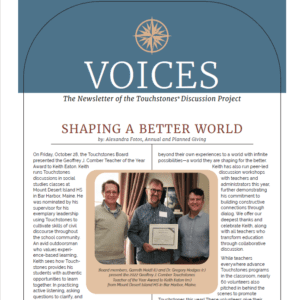By Debra Valentine

The first discussion of this new program will be on works by American author Kate Chopin, pictured here. Our syllabus includes works by Gertrude Stein, Sylvia Plath, Toni Morrison, and Margaret Atwood, among others.
Howard Zeiderman, Co-founder of the Touchstones Discussion Project and Director of Leadership Programs, and I are starting a new series designed to help us reflect on ourselves.
The readings are by women writers, and we will use them to probe issues of self-identity and historical and cultural differences and distances between ourselves— both between each other and the writers. While gender has become an increasingly fluid and plastic concept, it touches on every aspect of our individual and communal lives. So, much of our discussion should, we hope, improve our self-awareness and ideally, our understanding of others.
I am certainly aware that as a woman in the 1990s who was often the only woman in a conference room or meeting—whether at my old law firm or in businesses where I have worked—I was often not heard. It wasn’t because my voice was too soft, although we know that men hear voices differently than women do. My voice was simply overlooked. Often, a man would later restate or paraph
rase the idea I’d expressed earlier, and everyone would agree it was a good idea. The point is not whether the idea was good or bad but whether it was heard. I guess that is why Ruth Bader Ginsburg encouraged us to always speak our mind, even if our voices shake. We have to work harder to get our voices heard.
The gender environment has, thankfully, evolved a lot in the past 20 years, but there are still many ways in which various people’s voices are not heard in the same way that male voices are heard. This is not to say that males’ voices have lesser or no value—they have much to contribute. It is simply that other voices have equal value. Touchstones has always been a wonderful process for getting all participants in a group to listen to each other, to respect each other, and to think before they speak. We thought bringing a bit more of the Touchstones method into an adult discussion program based on works by women would be a great way of opening ourselves up to the voices of others.
While the readings we’ll be discussing are not necessarily the latest and most cutting edge on gender studies, we believe they are fertile touchstones for exploring gender. Indeed, many are ones I recall seeing on Justice Ginsburg’s library shelves. And we know she thought long and hard about what it means to be a woman in what has remained a male-dominated world. We hope many of you will join us, either this time or in a subsequent group, as we look forward to learning more about ourselves and each other.



 Join the
Join the